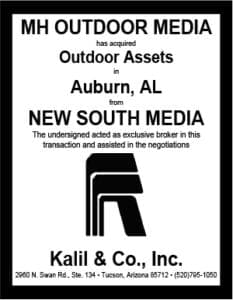
By Michael Wardle, General Counsel, YESCO Outdoor Media
If you’ve been in the outdoor business long enough, then there’s a good chance you have a received a letter from an attorney representing a landowner that challenges the validity of a ground lease. Such a letter may make one or more of the following (often unsubstantiated) claims:
- The property changed hands and the new landowner doesn’t accept your lease because your lease wasn’t recorded or the new owner wasn’t aware of the lease;
- Your lease is so unfair that it cannot be enforced;
- A new landowner believes they own your sign;
- You failed to follow a technicality (for example, sending a renewal option letter); or
- You missed one or more payments (due to a change of address, the landowner’s refusal to provide a W-9, or otherwise).
These letters are often a red herring; the presentation of claims is a tactic, not a demonstration of intent. The irony behind the threats is that the landowner usually wants to keep the lease. The threats are frequently a ruse to establish leverage to renegotiate rent, shorten the lease term, and add or modify terms that make it easier to sell or develop the property in the future.
I’ve reviewed my fair share of nasty demand letters through the years. I don’t remember any courses in law school that offered instruction on “How to Convert Paper and Toner Into A Warhead.” Somehow it becomes on-the-job training for certain law practices and practitioners. Responding in kind with your own artillery of words is ill advised; it will only escalate emotion, breakdown communication, and distract from the problem-solving task at hand. Find amusement in the absurdity of the letter and move on to developing a professional response that defends the claims and offers a path towards resolution.
Your first step in preparing to respond to a demand letter is to see if you can determine why the landowner hired an attorney and what the landowner really wants. A landowner will usually hire an attorney to negotiate a modification to a lease for one of the following reasons:
- The landowner is frustrated or angry and wants to fight;
- The landowner feels like he/she lacks the expertise or skill needed for the negotiation;
- The landowner believes that hiring an attorney will increase his/her leverage; and/or
- The landowner is busy and wants to delegate the task of negotiation.
Figuring out why the attorney was hired will help you strategize on the best response and guide your communication strategy. See if you can talk businessperson to businessperson, if possible, but avoid “going around” the attorney if the landowner truly doesn’t want to negotiate directly. If the attorney was hired to act as a human shield for the landowner, respect the landowner’s choice and communicate using the landowner’s preferred protocol, which is usually through his/her attorney. You may wish to use your own attorney to participate where appropriate.
Once you have determined the role of the attorney and the best communication strategy, determine the landowner’s position and motives. If the landowner is genuinely frustrated, an apology, opportunity to vent, or other de-escalating tactic may be appropriate. Give the landowner the opportunity to be heard and make sure the landowner confirms that you understand his/her position before offering a rebuttal or your own counteroffer. You should defend the validity of the lease with appropriate documentation and arguments, but avoid letting a dispute over the validity of the lease become the focus if it ultimately isn’t the issue.
In working towards a solution, I like to ask the following question: “What does a realistic resolution to this look like to you?” Like any other negotiation, find the solution that works for both parties. You have two ears and one mouth; use them in proportion. Educate the landowner on how rates are determined and the points that are important to both parties. Provide your landowner a fair rental if the current rental is significantly undervalued. The outdoor real estate business is long-term; your objective to maintain good relations with your landowner and find a win/win solution.
Of course, there are circumstances where the landowner really does want to end the lease, is unreasonable, or is simply a bully. Make your decision whether to fight based on economics and prudent judgment, not emotion or ego. If relocation is a possibility, focus your efforts there. If not, focus on finding an economic solution that makes the most sense under the circumstances.
[wpforms id=”9787″]
Paid Advertisement


















Well said!